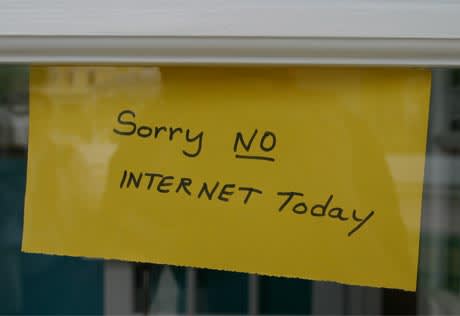For over a decade, the intellectual property rights debate has continued to boil over. Thanks to the rapidly growing sharing possibilities provided by the Internet, a mix of torrent sites, P2P networks and even social networking sites have allowed innumerable amounts of pirated material to be passed back and forth.
The debate on the issue has valid points on both sides, and its undeniable that the access to more music has inspired some incredible new music. Naturally, big business has remained pissed about the whole thing for some time. While watchdog groups like the RIAA have been, figuratively, busting the heads of illegal file-sharers, it was only a matter of time before a higher level of government got involved.
According to a report from Boing Boing, that's exactly what's set to happen. A secret copyright treaty spearheaded by the United States, called the Anti-Counterfeiting Trade Agreement was recently leaked, and it points to a dire future for the Internet.
Here's Boing Boing's helpful break-down of what the document says:
* That ISPs have to proactively police copyright on user-contributed material. This means that it will be impossible to run a service like Flickr or YouTube or Blogger, since hiring enough lawyers to ensure that the mountain of material uploaded every second isn't infringing will exceed any hope of profitability.
* That ISPs have to cut off the Internet access of accused copyright infringers or face liability. This means that your entire family could be denied to the internet - and hence to civic participation, health information, education, communications, and their means of earning a living - if one member is accused of copyright infringement, without access to a trial or counsel.
* That the whole world must adopt U.S.-style "notice-and-takedown" rules that require ISPs to remove any material that is accused - again, without evidence or trial - of infringing copyright. This has proved a disaster in the U.S. and other countries, where it provides an easy means of censoring material, just by accusing it of infringing copyright.
* Mandatory prohibitions on breaking DRM, even if doing so for a lawful purpose (e.g., to make a work available to disabled people; for archival preservation; because you own the copyrighted work that is locked up with DRM)
If and when these legislations are passed, it will be the first step towards ending the open and free communication that the Internet has allowed us, not just for music but for knowledge in general. On the bright side, a government-controlled Internet might reignite the dying independent print medium.
The debate on the issue has valid points on both sides, and its undeniable that the access to more music has inspired some incredible new music. Naturally, big business has remained pissed about the whole thing for some time. While watchdog groups like the RIAA have been, figuratively, busting the heads of illegal file-sharers, it was only a matter of time before a higher level of government got involved.
According to a report from Boing Boing, that's exactly what's set to happen. A secret copyright treaty spearheaded by the United States, called the Anti-Counterfeiting Trade Agreement was recently leaked, and it points to a dire future for the Internet.
Here's Boing Boing's helpful break-down of what the document says:
* That ISPs have to proactively police copyright on user-contributed material. This means that it will be impossible to run a service like Flickr or YouTube or Blogger, since hiring enough lawyers to ensure that the mountain of material uploaded every second isn't infringing will exceed any hope of profitability.
* That ISPs have to cut off the Internet access of accused copyright infringers or face liability. This means that your entire family could be denied to the internet - and hence to civic participation, health information, education, communications, and their means of earning a living - if one member is accused of copyright infringement, without access to a trial or counsel.
* That the whole world must adopt U.S.-style "notice-and-takedown" rules that require ISPs to remove any material that is accused - again, without evidence or trial - of infringing copyright. This has proved a disaster in the U.S. and other countries, where it provides an easy means of censoring material, just by accusing it of infringing copyright.
* Mandatory prohibitions on breaking DRM, even if doing so for a lawful purpose (e.g., to make a work available to disabled people; for archival preservation; because you own the copyrighted work that is locked up with DRM)
If and when these legislations are passed, it will be the first step towards ending the open and free communication that the Internet has allowed us, not just for music but for knowledge in general. On the bright side, a government-controlled Internet might reignite the dying independent print medium.




